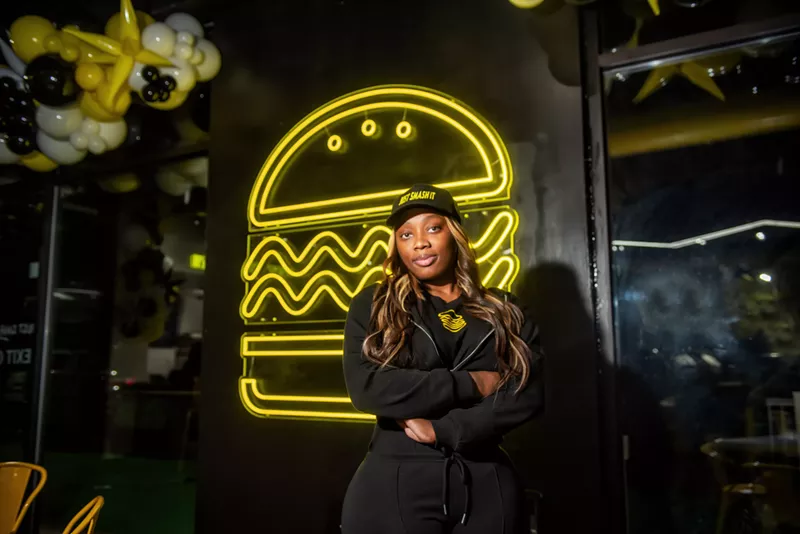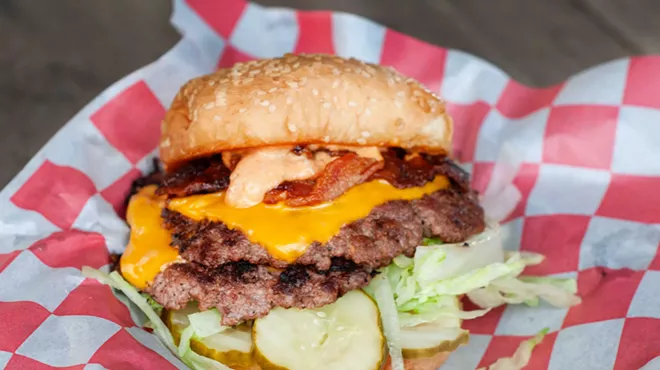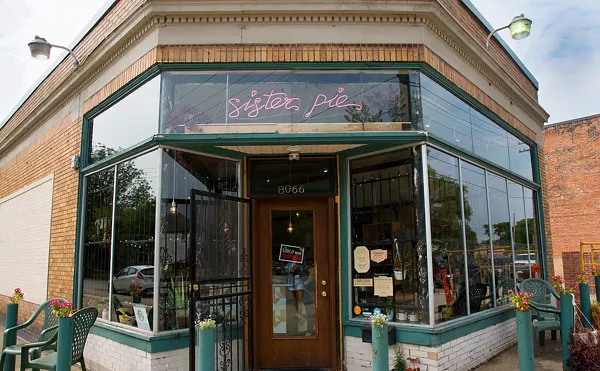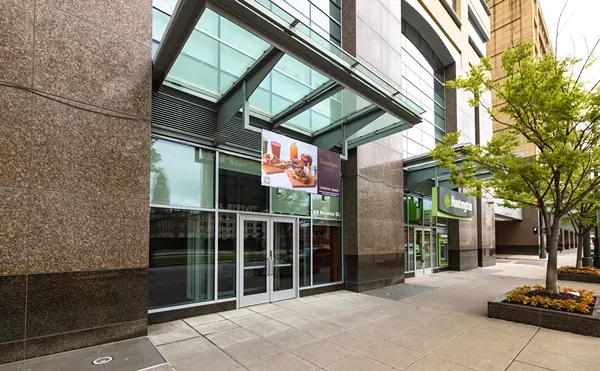How Matashia Dykes went from smash hits to smashburgers
The former rapper opened her new Just Smash It restaurant on Eight Mile

Audio By Carbonatix
[
{
"name": "GPT - Leaderboard - Inline - Content",
"component": "35519556",
"insertPoint": "5th",
"startingPoint": "3",
"requiredCountToDisplay": "3",
"maxInsertions": 100,
"adList": [
{
"adPreset": "LeaderboardInline"
}
]
}
]

Just Smash It is in the middle of an unexpected 6:30 p.m. rush. Three young women wearing scrubs are using the restaurant’s kiosk to browse the menu, while four Detroit police officers and others are standing to the side waiting for their carryout orders.
This burger joint has been open for less than three weeks, and they’re still figuring out their peak periods. As soon as the rush dies down, rappers Tay-B and Skilla Baby stroll in amid a new wave of customers. By now it’s 7 p.m. and the restaurant’s owner, Matashia Dykes, promises me that she’ll be ready for our interview soon.
Another half hour goes by and her friend and fellow entrepreneur Darlynn Mumphord tells me she’s ready. I’m escorted through the kitchen, where employees are grilling burgers, dropping fries, and bagging orders. We arrive at a small, furnished office at the rear of the restaurant, where Dykes is seated wearing fatigue like a busy apron.
“That was crazy — you saw that!” she says with a sigh of relief. “I’m thankful, though — it's all been a blessing.”
Dykes is a self-described hustler, a proud native of Detroit’s east side, a member of King High School’s graduating class of 2009, and someone who’s been characterized as a serial entrepreneur.
“I’ll try whatever, and if it works, it works,” she says. “You got some people — they try something, and if it don’t work, they’ll give up on life, period.”
Dykes’s first foray into entrepreneurship came as a teenage hair stylist. At the early age of 14, she built up a clientele so strong that her stepfather gifted her a salon on Cadieux and Harper. But as promising as the venture was, the need to experience life as a regular teenager started to matter more.
“I was young, and it was cutting into my me-time,” she says with a laugh. “At the end of the day, I’m doing everyone’s hair and they’re getting dressed to go out, and I’m still not ready. I’m like, ‘I can’t do this. I gotta do something else to make money.’”
For the next several years, Dykes worked at Chili’s, managed a Jimmy Jazz clothing store, and worked as a bartender at a gentlemen’s club. In 2016, she jumped into the world of hip-hop. The venture was more for fun, as she didn’t consider herself a hip-hop head looking for instant fame.
“I was dating someone — it started off as a prank,” she says.
Dykes dropped her own remix to Desiigner’s hit “Panda” that went “Detroit viral.” She followed up in 2018 with her debut project, Bag Secured (highlighted by the single “Wdyl”), and tipped all the scales in her favor when she joined Rio Da Yung OG on “Displayer.”
Dykes was bold and tenacious behind the mic. “I really spin you hoes’ niggas like a displayer/The coldest bitch in my city, MT for mayor,” she raps on “Displayer.” But even with a steadily rising fan base, the shadiness of the music business got to be too much for her to deal with.
“I liked doing music, but I didn't love it,” she says. “It wasn’t really my passion. It was starting to … but what came with it, I just wasn’t built for. I’m a woman at the end of the day, and certain guys got leverages — they try to blackmail you, and I ain’t doing that for that.”
While Dykes was enduring the life of a female rapper, she opened the iBODY clothing store on East Eight Mile, across from Eastland. Her store sold crop tops, bodysuits, leggings, and swimsuits.
“It was so crazy,” she says, “because I’m like, ‘Dang, I used to work at the [Chili’s] across the street. Now I got my own clothing store facing it.”
After opening a second location, Dykes decided to close down both stores due to recurring disputes with the business entity she was leasing the property from. Her next venture came in 2023, when she purchased Maison’s Fine Foods on Mack Avenue. Maison’s had been a Detroit staple since 1943, and it was Dykes’s first time owning a restaurant.
“I always had this idea,” she says. “Just Smash It and Maison’s came at the exact same time, but Maison’s was what I could afford.”
Her ownership of Maison’s lasted only a year, but the experience served as a tough love tutorial in how to operate an eatery.
“Now I’m getting the feel of it,” she says adamantly. “Maison’s was smaller, only 1,100 square feet. I’m in 3,300 square feet now,” she says confidently. “I’m triple the size.”
Dykes’s demeanor is relatable. She carries herself like a down-to-earth boss bitch who doesn’t need to remind you of such every 10 seconds. With Just Smash It, Dykes feels she’s found the cornerstone business that she can continue to build off of. She’s found a niche in Detroit’s burger industry, as smashburgers — patties pressed thin while cooking so they get a nice char — are offered at other restaurants, but aren’t often the primary meal that’s marketed. Her menu also offers turkey and Impossible smashburger options, along with a full bar with daiquiris and Wet Willies.
“I just wanted to give it something nobody else had,” Dykes says. “A lot of these restaurants get so big, they start to give out bullshit. The food be processed. Here, everything is 100 percent what it is. You get a home feel when you eat here. I’m not serving anything processed, and I’m giving it a home feel. I believe that's what's going to keep me going and keep me different.”
Despite her success, Dykes has faced her fair share of challenges along the way. She can offer up multiple stories about how being a woman has made it harder to earn what she has. Her construction contractor held up the opening of Just Smash It for a month, as renovations to the building weren’t complete. She’s also been the target of some good old sneak dissing from competing establishments in the area.
“People around me saw us coming — probably saw us as a threat and was hating a little bit,” she adds.
In the future, Dykes plans to incorporate breakfast options and wants to be able to franchise Just Smash It out to other aspiring entrepreneurs. She also hasn’t ruled out a return to the mic.
When asked what she would tell young, aspiring Black women who want to follow in her footsteps, Dykes just wants to see young women stay focused and not get sidetracked by what they see on the internet.
“It's a good place,” she says, “but it’s a bad place sometimes. They don’t know what a lot of people have to do to get what they have or be the places they are.”







